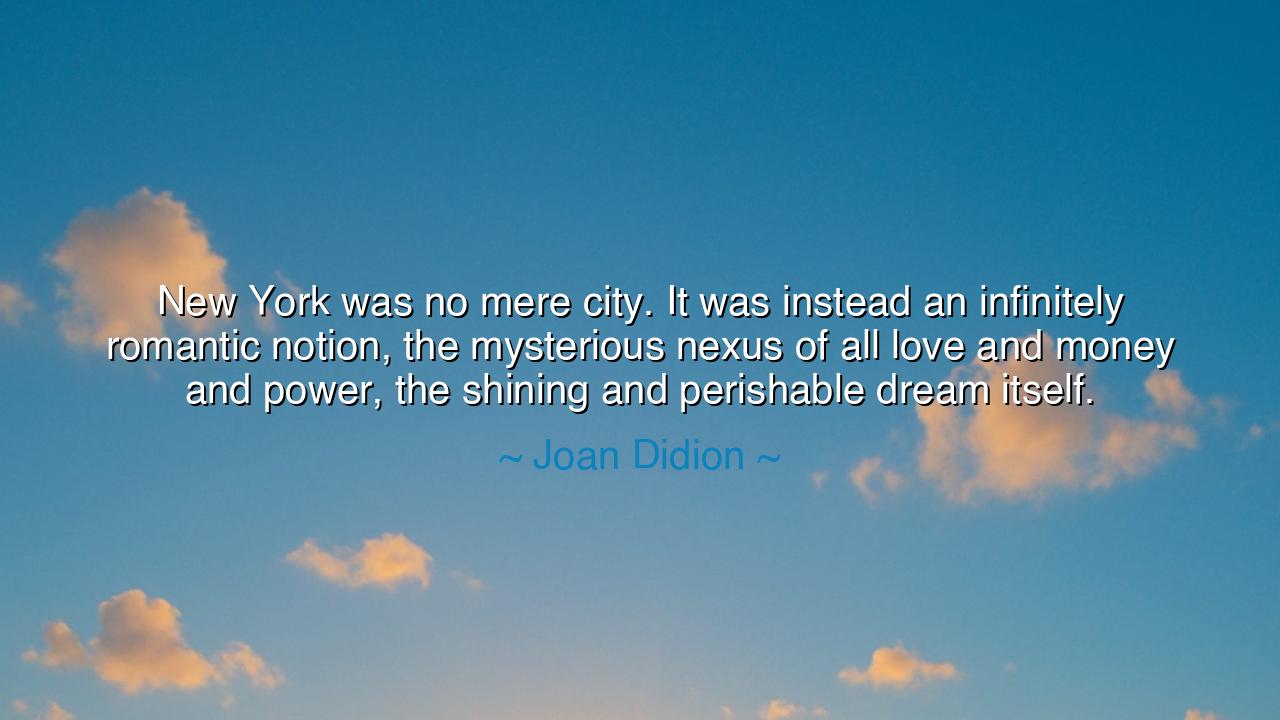
New York was no mere city. It was instead an infinitely romantic
New York was no mere city. It was instead an infinitely romantic notion, the mysterious nexus of all love and money and power, the shining and perishable dream itself.






“New York was no mere city. It was instead an infinitely romantic notion, the mysterious nexus of all love and money and power, the shining and perishable dream itself.” So writes Joan Didion, seer of American myth and memory. In her words, New York is not stone, not glass, not streets and bridges—it is an idea, alive with promise and danger, love and ambition, a place where the human spirit dreams its wildest and yet also faces its sharpest ruin.
To call it “no mere city” is to confess that New York transcends geography. It is the romantic notion of possibility itself—the belief that in its crowded avenues, destinies are forged. For some, it is the promise of love, a meeting of kindred souls amidst millions of strangers. For others, it is money, the ascent from poverty to wealth. For yet others, it is power, the ability to shape not only one’s own life but the lives of nations. Yet Didion reminds us that these are bound together, entwined inextricably in one shimmering dream: love, money, power, all flowing through the same electric veins of the city.
The ancients, though they did not know New York, knew the lure of such shining dreams. Babylon, Rome, Athens—all were once “no mere cities.” Each became symbols greater than themselves: of empire, of knowledge, of glory, and of ruin. To live in them was to live in the heart of history, to feel that one’s own life was magnified by proximity to greatness. So too with New York: it is not just a place of residence, but a stage upon which the drama of humanity is played in its most heightened form.
History offers examples of this allure. Think of F. Scott Fitzgerald, whose The Great Gatsby painted New York as the land of possibility and destruction, where love and wealth danced together under glittering lights, only to end in disillusion. For Fitzgerald, as for Didion, New York was both intoxicating and perilous—a perishable dream, beautiful but fragile, capable of lifting one to the heavens or casting one into despair. It is this duality that makes the city romantic: its brilliance lies not in permanence, but in its fleeting, burning intensity.
Didion’s words also reveal the paradox of romance itself. To call something infinitely romantic is to acknowledge both its power to inspire and its inability to last. Love, money, power—all are unstable, shimmering for a moment before dissolving. New York embodies this impermanence: a city forever renewing itself, destroying yesterday to build tomorrow. It is a dream that survives precisely because it cannot be held, only chased.
The lesson here is profound: do not mistake the dream for reality, yet do not despise the dream either. For in chasing it, people find their courage, their ambition, their sense of life’s grandeur. New York’s romance lies in its reminder that to live fully is to risk heartbreak, that beauty and loss are inseparable. The city teaches that every shining thing is also fragile, every dream perishable—and that this fragility is what makes it precious.
Therefore, beloved listener, take Didion’s wisdom into your own journey. Seek your own New York, whether it be a city, a dream, or a calling. Know that it will dazzle and it may wound, but it will awaken you to the fullness of living. Do not cling to permanence; embrace instead the perishable dream, for it is in its very fragility that its beauty lies. And when you look upon your own shining notion of love, money, or power, remember: it is not mere reality, but romance itself—the light that calls the soul ever forward.






AAdministratorAdministrator
Welcome, honored guests. Please leave a comment, we will respond soon